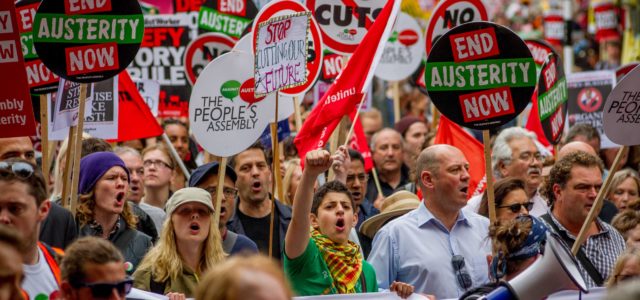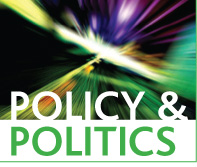Daniel Edmiston and Louise Humpage
The Policy and Politics section of Discover Society is provided in collaboration with the journal Policy & Politics. The section is curated by Sarah Brown.
Across advanced capitalist economies, welfare withdrawal and reform are undermining the rights, identity and belonging of low-income social citizens. Amidst this upheaval, welfare claimants are engaged in diverse political struggles for and against social citizenship. What risks and opportunities does this present for the future direction of welfare politics? To answer this question, our recent Policy & Politics article explores how welfare claimants negotiate the institutions and ideals driving successive rounds of welfare reform over time.
The uneven effects of welfare austerity contradict the notion that ‘we are all in this together’. The promise of shared sacrifice and frugality has failed to materialize across the developed world with the rich and the poor pulling further apart from one another since the global financial crisis. Increasingly restrictive welfare provision has been driven by penalizing and disciplinary reforms targeted at those most reliant on low-income social security and assistance.
This has caused significant financial hardship and insecurity across liberal welfare regimes. Those affected pursue a variety of strategies to overcome their limited financial resources, with many struggling to meet the basic needs of themselves and their immediate family.
Our research undertaken in the New Zealand context outlines the significant effort that goes into ‘trying to survive’ on welfare. Many of those affected by successive welfare reforms felt that their material condition precluded them from mainstream society and activities:
“Opportunities and education and work and leisure and exercise, fitness, opportunities in all those kind of spheres are out of reach because my partner and I don’t have enough money to engage in most, well, some of those areas.” (Jack)
In an attempt to secure their basic well-being, some individuals were unable to take public transport, resorted to stealing food and children’s clothing, grew their own vegetables, borrowed money from friends and family, altered or reduced their dietary intake, stopped getting their haircut and wearing make-up. One individual had to temporarily turn to prostitution. Another individual had to live in their car for a number of weeks before they were re-housed:
“We can’t actually survive on the… I’m unemployed and we can’t survive on the money the government gives us. Friends lend me money and my son who is 27 is still sharing with me and giving me as much as he possibly can.” (Jessica)
Against this backdrop, it becomes more and more difficult to characterise low-income social security claimants even as ‘conditional citizens’. Arguably, the uncertainty with which these individuals are able to secure their basic wellbeing has led to a further degradation of their ‘second-class citizenship’.
“I don’t feel like a valued citizen at all.” (Holly)
Overwhelmingly, those affected by the most recent round of welfare reform felt that they had been excluded from the rights and status of social citizenship. Their social, economic and political marginality undermined a sense of collective citizen identity and common belonging:
“We never used to have poverty. We used to have welfare – but it was adequate. We only have poverty now because our welfare system is so woefully inadequate.” (Rebecca)
The material and symbolic exclusion arising from recent welfare reforms has impelled those affected to engage in distinct acts of claims making to fight for their status and rights as social citizens. These changes appear to have instigated a more activist and dissident politics amongst many low-income social security claimants.
For some, attempts to defend their claim to social assistance entailed a tacit endorsement of welfare politics and policies in its current form. In trying to justify their own claims making, some appeared to have internalized the discourse and logic of welfare reform. Seeking to distinguish themselves from the problematic ‘other’, some welfare claimants defended their own entitlement to social assistance over the ‘undeserving poor’:
“What annoys me is these people coming over here and they can’t even speak English. I see them applying for a benefit and they get it straight away.” (Cameron)
In this regard, the political subjectivity of welfare claimants can manifest itself in a resignation to the terms upon which citizenship status and rights are granted, but a resistance to their own positioning within such a system. While this may result in remedial concessions, struggles for social rights ‘through the existing narratives of citizenship’ relies on established modes of thought and conduct that, as observed across mature welfare regimes, can give legitimation to and reproduce social inequalities.
By contrast, those acts of claims making that seek to resist or reconfigure welfare institutions, have the capacity to generate creative ruptures that alter the character and practice of social citizenship.
Those affected by welfare reform engage in private and public struggles to challenge the policies that have caused heightened degrees of material and symbolic exclusion. Our research suggests this has prompted a more critical, adversarial politics amongst many low-income social security claimants who are fighting against the treatment received and decisions taken by welfare institutions and practitioners.
“I’m battling to get the scraps only to be humiliated and belittled by the people at Work and Income.” (Jessica)
“I’m not going to be treated like shit. I know my rights. I know the laws. I will fight for what I deserve.” (Jack)
”It’s just so unfair that we have to fight for your rights… just to be… to be normal.” (Toby)
Such acts and engagements tend to focus on matters of survival and protection rather than questions of systemic progress and transformation. Whilst this often involves criticism of public services and social assistance, the political action and procedural struggles of welfare claimants tend to focus on their respective disentitlements. As a result, these individuals do not always connect their own injustices with that of others similarly affected by welfare reform.
Interest in the adversarial politics of social citizenship appears to be increasing amongst those most negatively affected by austerity and welfare reform. This presents an opportunity to resist and reconfigure welfare policy. However, without recognition of how their individual troubles are shared and commonly connected to broader regimes of welfare, inequality and citizenship, low-income social security claimants lack the means of collective identification to engage in a sustained and collective political struggle for their status and rights as social citizens. In the future, if a collective movement against the welfare institutions that structure inequality is to be successful, it must be mobilized in a way that strengthens common experiences and political action without reproducing or giving credence to existing social divisions.
Daniel Edmiston is a post-doctoral researcher at the University of Oxford and Louise Humpage is a Senior Lecturer at the University of Auckland. This article is based on two studies exploring lived experiences of welfare, inequality and social citizenship. These are considered in further detail in Policy and Politics (Fast track, November 27th 2016) ‘Resistance or resignation? The activist politics for and against social citizenship’.
Image: Michael Candelori. CC BY-SA 2.0

